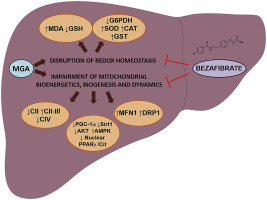Biochimie ( IF 3.9 ) Pub Date : 2020-03-10 , DOI: 10.1016/j.biochi.2020.03.007 Nevton Teixeira da Rosa-Junior , Belisa Parmeggiani , Nícolas Manzke Glänzel , Leonardo de Moura Alvorcem , Marina Rocha Frusciante , Carlos Severo Dutra Filho , Moacir Wajner , Guilhian Leipnitz

|
High urinary excretion and tissue accumulation of 3-methylglutaric acid (MGA) are observed in patients affected by 3-hydroxy-3-methylglutaric (HMGA) and 3-methylglutaconic (MGTA) acidurias. The pathomechanisms underlying the hepatic dysfunction commonly observed in these disorders are not fully elucidated so that we investigated here the effects of intraperitoneal administration of MGA on redox homeostasis, mitochondrial bioenergetics, biogenesis and dynamics in rat liver. The effects of a pre-treatment with the protective compound bezafibrate (BEZ) were also determined. Our data showed that MGA induced lipid peroxidation and altered enzymatic and non-enzymatic antioxidant defenses in liver, indicating redox homeostasis disruption. BEZ prevented most of these alterations induced by MGA. MGA also decreased the activities of the respiratory chain complexes II and IV and increased of II-III, whereas BEZ prevented the alteration in complex II activity. Furthermore, MGA decreased levels of nuclear PGC-1α and Sirt1, and increased levels of AMPKα1 and cytosolic PPARγ, which were blocked by BEZ. MGA augmented the levels of mitofusin-1 and dynamin-related protein 1, suggesting that both fusion and fission mitochondrial processes are enhanced by MGA. BEZ was able to prevent only the changes in mitofusin-1 levels. Collectively, these findings indicate that oxidative stress and mitochondrial dysfunction are mechanisms involved in the hepatic dysfunction found in HMGA and MGTA. It is also presumed that mitochondrial biogenesis stimulation may constitute an attractive approach to reduce MGA toxicity in liver of individuals affected by HMGA and MGTA.
中文翻译:

体内证据表明苯扎贝特可预防大鼠肝脏中由3-甲基戊二酸引起的氧化应激和线粒体功能障碍
在受3-羟基-3-甲基戊二酸(HMGA)和3-甲基戊二酸(MGTA)尿酸影响的患者中观察到3-甲基戊二酸(MGA)的高尿排泄和组织积聚。在这些疾病中通常观察到的肝功能不全的病理机制尚未完全阐明,因此我们在这里研究了腹膜内施用MGA对大鼠肝脏氧化还原稳态,线粒体生物能,生物发生和动力学的影响。还确定了用保护性化合物苯甲酸酯(BEZ)进行预处理的效果。我们的数据表明,MGA诱导脂质过氧化并改变了肝脏中的酶促和非酶促抗氧化剂防御能力,表明氧化还原稳态被破坏。BEZ阻止了大多数由MGA引起的改变。MGA还降低了呼吸链复合物II和IV的活性,并增加了II-III的活性,而BEZ阻止了复合物II活性的改变。此外,MGA降低了核PGC-1α和Sirt1的水平,并增加了被BEZ阻断的AMPKα1和胞质PPARγ的水平。MGA增强了mitofusin-1和动力蛋白相关蛋白1的水平,表明MGA增强了融合和裂变线粒体过程。BEZ只能阻止mitofusin-1水平的变化。总的来说,这些发现表明氧化应激和线粒体功能障碍是HMGA和MGTA中发现的肝功能障碍的机制。



























 京公网安备 11010802027423号
京公网安备 11010802027423号